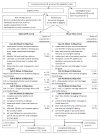Mixed methods evaluation of a randomized control pilot trial targeting sugar-sweetened beverage behaviors
- PMID: 23997992
- PMCID: PMC3755775
- DOI: 10.4236/ojpm.2013.31007
Mixed methods evaluation of a randomized control pilot trial targeting sugar-sweetened beverage behaviors
Abstract
This Excessive sugar-sweetened beverage (SSB) consumption and low health literacy skills have emerged as two public health concerns in the United States (US); however, there is limited research on how to effectively address these issues among adults. As guided by health literacy concepts and the Theory of Planned Behavior (TPB), this randomized controlled pilot trial applied the RE-AIM framework and a mixed methods approach to examine a sugar-sweetened beverage (SSB) intervention (SipSmartER), as compared to a matched-contact control intervention targeting physical activity (MoveMore). Both 5-week interventions included two interactive group sessions and three support telephone calls. Executing a patient-centered developmental process, the primary aim of this paper was to evaluate patient feedback on intervention content and structure. The secondary aim was to understand the potential reach (i.e., proportion enrolled, representativeness) and effectiveness (i.e. health behaviors, theorized mediating variables, quality of life) of SipSmartER. Twenty-five participants were randomized to SipSmartER (n=14) or MoveMore (n=11). Participants' intervention feedback was positive, ranging from 4.2-5.0 on a 5-point scale. Qualitative assessments reavealed several opportunties to improve clarity of learning materials, enhance instructions and communication, and refine research protocols. Although SSB consumption decreased more among the SipSmartER participants (-256.9 ± 622.6 kcals), there were no significant group differences when compared to control participants (-199.7 ± 404.6 kcals). Across both groups, there were significant improvements for SSB attitudes, SSB behavioral intentions, and two media literacy constructs. The value of using a patient-centered approach in the developmental phases of this intervention was apparent, and pilot findings suggest decreased SSB may be achieved through targeted health literacy and TPB strategies. Future efforts are needed to examine the potential public health impact of a large-scale trial to address health literacy and reduce SSB.
Keywords: beverages; health behavior; health education; health literacy; pilot projects; public health.
Figures
References
-
- Duffey KJ, Popkin BM. Shifts in patterns and consumption of beverages between 1965 and 2002. Obesity. 2007;15:2739–2747. - PubMed
-
- Nielsen-Bohlman L, Panzer AM, Kindig DA, editors. Health Literacy: A Prescription to End Confusion. Washington, DC: National Academies Press; 2004. - PubMed
-
- Berkman NSS, Donahue K, et al. Health literacy interventions and outcomes: An update of the literacy and health outcomes systematic review of the literature. Chapel Hill, NC: RTI International-University of North Carolina Evidence-based Practice Center; 2011.
Grants and funding
LinkOut - more resources
Full Text Sources
Other Literature Sources
Research Materials

